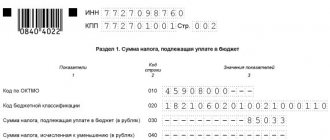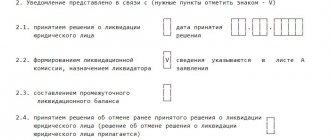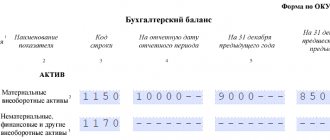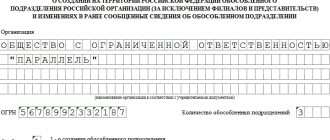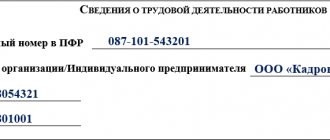The expansion of a business always pleases its owner, but it also brings new reports into the life of an accountant. Such a report could be a notification of controlled transactions, the need to submit which is not always related to the amount of annual revenue. We will tell you who should submit this application and the procedure for filling it out in the 1C: Accounting 8 program, version CORP.
- Who submits notification of controlled transactions
- Filling out the notification preparation assistant in “1C: Accounting 8”
What changed in the form?
The barcodes in Appendix No. 1 “Notifications of Controlled Transactions” are being changed, and the new edition also sets out:
- section 1A “Information on a controlled transaction (group of similar transactions)” (fields 139 and 140 are excluded to reflect the code of the basis for classifying a transaction as controlled in connection with the new edition of such codes);
- table “Code of the basis for classifying a transaction as controlled” Appendix No. 1 (some codes have been redistributed and do not indicate the same characteristics as in the current form);
- Appendix 2 “Format for submitting notifications of controlled transactions in electronic form.”
For example, code 131 will need to be noted if the transaction is controlled due to the fact that the counterparties apply different income tax rates to the profits from activities within such a transaction (this does not apply to a number of rates, for example, for dividends). According to the current procedure for filling in, this code indicates the case when the amount of income from transactions exceeded the amount threshold for recognizing a transaction as controlled.
Filling out sections 2 and 3: what to pay attention to
If the taxpayer entered into a transaction with a counterparty in the status of a legal entity, then for this transaction he must fill out section 2 of the notification. If the contract is signed with a counterparty in the status of an individual, Section 3 of the notification must be completed. The structure of sections 2 and 3 is almost identical.
In column 015 of section 2 or 3 the same figure must be recorded as indicated in column 050 of section 1B. This is the serial number of the counterparty. The taxpayer determines it independently, for example, based on the order in which contracts are concluded.
Similarly, in column 010 of section 2 or 3, the same figure is recorded as indicated in column 010 of section 1A. It corresponds to the serial number of the transaction and is also determined by the taxpayer independently.
In general, the number of sheets in section 2 or 3 corresponds to the number of sheets in sections 1A and 1B. In practice, the number of controlled transactions and counterparties a company can have is very large, so indicating each individual transaction in a document can be an extremely labor-intensive process.
But taxpayers have the opportunity to reflect transactions of the same type in the notification - and this is a significant help for them in terms of saving time. However, the firm must have compelling reasons to group transactions into one group.
Let's study the main criteria for classifying transactions recorded in a notification as similar.
What transactions are controlled?
The list of such transactions is specified in Art. 105.14 of the Tax Code. In particular, such transactions include:
- transactions with an interdependent Russian organization from clause 2 of Art. 105.14 of the Tax Code of the Russian Federation with an annual income of more than 1 billion rubles. For example, transactions with organizations that apply a zero rate of income tax, or payers of the Unified Agricultural Tax.
- transactions with an interdependent non-resident with an annual income of more than 60 million rubles.
- transactions with an offshore company with an annual income of more than 60 million rubles.
Services > Services to individuals > Preparation and submission of notifications on CFC
Filing a notice of participation in foreign organizations and a notice of controlled foreign companies (CFC)
In accordance with Article 25.14 of the Tax Code of the Russian Federation, tax residents of the Russian Federation - INDIVIDUALS AND LEGAL ENTITIES - are required to notify the tax authority at the place of residence or at the location of the organization, respectively:
1) about his participation in foreign organizations (about the establishment of foreign structures without forming a legal entity); 2) about controlled foreign companies of which they are controlling persons.
These are TWO different types of Notices that must be submitted (or may not be submitted subject to certain conditions discussed below) to the tax authority to the person who owns the foreign company.
Let's consider both options sequentially.
In accordance with clause 1 clause 3.1. Article 23 of the Tax Code of the Russian Federation, the taxpayer is obliged to notify the tax authority of both direct and indirect participation in foreign organizations if the share of such participation exceeds 10% (precisely exceeds, i.e. owning a share of exactly 10% does not give rise to the obligation to submit a notification). At the same time, the share of indirect participation in a foreign organization is determined in the manner established by Art. 105.2 Tax Code of the Russian Federation.
It is also necessary to notify about participation in foreign organizations if participation in them is carried out through nominees.
Example. You are a beneficiary of a Cyprus company - You are not a director or a shareholder, you are a beneficiary whose rights to the company arise by virtue of a declaration of trust - the law nevertheless requires you to file a Notice as the person in control of the company. At the same time, “control” is understood as the right to influence when deciding on the distribution of company profits.
The obligation to notify also lies with taxpayers who have established a so-called ISBOLE - a foreign structure without forming a legal entity (this includes current British LLPs and Scottish LP partnerships) . In accordance with paragraph 2 of Article 11 of the Tax Code of the Russian Federation, ISBOLE is understood as an organizational form created in accordance with the legislation of a foreign state (territory) without the formation of a legal entity (in particular, a fund , partnership, partnership, trust , other form of collective investment and ( or) trust management), which, in accordance with its personal law, has the right to carry out activities aimed at generating income (profit) in the interests of its participants (shareholders, principals or other persons) or other beneficiaries .
Deadline for submitting notification
In accordance with paragraph 3 of Art. 25.14 Tax Code of the Russian Federation:
A notification of participation in foreign organizations (on the establishment of foreign structures without forming a legal entity) is submitted no later than three months from the date of occurrence (change of share) of participation in such a foreign organization (the date of establishment of a foreign structure without forming a legal entity), which is the basis for the submission such notice.
Procedure and form for submitting notification
Forms of notifications of participation in foreign organizations were approved by Order of the Federal Tax Service of the Russian Federation dated April 24, 2015 No. ММВ-7-14/ [email protected] - applied BEFORE August 12, 2021 and Order of the Federal Tax Service of Russia dated 07/05/2019 N ММВ-7-13/ [ email protected] - applies AFTER August 12, 2021. Please note that:
- legal entities must send a notification exclusively in electronic form, only via telecommunication channels (TCC) and only with an enhanced qualified electronic signature (ECES)*
- individuals have the right to submit a notice on paper
— applied BEFORE August 12, 2019
— applies from August 12, 2019
* See Resolution of the 9th AAC in case No. A40-24922/16 dated August 18, 2021 on the imposition of a fine under Art. 129.6 of the Tax Code of the Russian Federation, against a legal entity due to a violation of the deadline for submitting a notification of participation in foreign organizations in electronic form. On our own behalf, we will say that the matter is quite interesting, because... The taxpayer-legal entity submitted the relevant notifications, however, only on paper. Similar notifications were submitted electronically in violation of the deadline provided for by current legislation. The court sided with the tax authority, indicating that in relation to legal entities, the only APPROPRIATE form of filing a notification is the electronic form, and the only appropriate way is according to the TKS.
Penalty for failure to submit or late submission of notifications
In accordance with paragraph 2 of Article 129.6 of the Tax Code of the Russian Federation
Unlawful failure by a taxpayer to submit a notice of participation in foreign organizations to the tax authority within the prescribed period or submission of a notice of participation in foreign organizations containing false information,
entails a fine in the amount of 50,000 rubles in respect of each foreign organization, information about which is not provided or in respect of which false information is provided.
This fine is a one-time penalty.
If incomplete information, inaccuracies or errors are detected in filling out the submitted notification of participation in foreign organizations, the taxpayer also has the right, on the basis of clause 7 of Article 25.14 of the Tax Code of the Russian Federation, an updated notification to the tax authority . If an updated notification is submitted before the taxpayer has learned that the tax authority has determined that the notification contains false information, the taxpayer is released from liability under Article 129.6 of this Code.
Cost of our services
| Service | Cost, rub. |
| Oral consultations regarding the need to submit a notification of participation in a foreign organization. Analysis of the Client’s corporate structure | 10,000 rub./hour |
| Preparation of Notice of Participation in Foreign Organizations | from 7 000* |
| Preparation of Notice of termination of participation in foreign organizations | 7 000 |
| Submitting a Notification to the tax authority by proxy (for individuals on paper, for legal entities - only electronically through TKS using enhanced CEP) | 2 500 |
| Written consultation in the form of a legal opinion | from $900 |
*Depending on the complexity of the corporate structure. The indicated price includes an analysis of the ownership structure, as well as oral consultations related to CFC
What is a “controlled foreign company” (CFC)?
After the issue has been analyzed regarding the need to notify the tax authority about participation in foreign organizations, it is necessary to analyze the issue of whether your foreign organization is a CFC - a “controlled foreign company”. IMPORTANT! It is necessary to notify about participation in foreign organizations regardless of whether these organizations fall under the criteria of a CFC or not. If foreign organizations also fall under the CFC criterion, then TWO notifications must be submitted to the tax authority.
I. Let's consider which foreign organizations fall under the status of a CFC - controlled foreign company. In accordance with paragraph 1 of Article 25.13. The Tax Code of the Russian Federation recognizes a company as a controlled foreign company (CFC)
- Not a tax resident of the Russian Federation;
- The controlling person of which is an organization and (or) an individual recognized as tax residents of the Russian Federation.
II. KIC in accordance with clause 2 of Article 25.13. The Tax Code of the Russian Federation also recognizes a foreign structure without the formation of a legal entity (ISBOYUL) , the controlling persons of which are organizations and (or) individuals recognized as tax residents of the Russian Federation.
"Controlling Person"
For the purposes of the above paragraphs, under “ controlling person ” in accordance with paragraph 3 of Article 25.13. The Tax Code of the Russian Federation is understood as follows:
- An individual or legal entity whose participation in this organization is more than 25% ;
- An individual or legal entity whose share of participation in this organization (for individuals - together with spouses and minor children) is more than 10%, if the share of participation of all persons recognized as tax residents of the Russian Federation in this organization (for individuals - together with spouses) and minor children ) is more than 50 percent .
The controlling person of ISBOYUL is recognized as the founder (founder) of such a structure - clause 9 of Article 25.13 of the Tax Code of the Russian Federation . Also, the controlling person of the ISBOLEU is recognized as another person who is not its founder (founder), if such person exercises control over the ISBOLEU and at the same time, in relation to this person, at least one of the following conditions is met - clause 12 of Article 25.13 of the Tax Code of the Russian Federation : 1) such the person has the actual right to the income (part of it) received by such a structure; 2) such a person has the right to dispose of the property of such a structure; 3) such a person has the right to receive the property of such a structure in the event of its termination (liquidation, termination of the contract).
* A person is NOT recognized as a controlling person of a foreign organization if his participation in this foreign organization is realized exclusively through direct and (or) indirect participation in one or more public companies that are Russian organizations - clause 4 of Article 25.13. Tax Code of the Russian Federation.
Which companies do not fall under the CFC status?
IMPORTANT! The founder (founder) of a foreign structure without forming a legal entity is NOT recognized as a controlling person simultaneously in relation to this founder (founder) : 1) such a person does not have the right to receive (demand to receive) directly or indirectly the profit (income) of this structure in whole or in part; 2) such a person does not have the right to dispose of the profit (income) of this structure or part of it; 3) such a person did not retain the right to the property transferred to this structure (the property was transferred to this structure on an irrevocable basis). This condition, established in relation to a person who is the founder (founder) of a foreign structure without forming a legal entity, is considered fulfilled if this person does not have the right to receive the assets of such a structure in whole or in part into his own ownership in accordance with personal law and (or) constituent documents of this structure throughout the entire period of existence of this structure, as well as in the event of its termination (liquidation, termination of the contract); 4) such a person does not otherwise exercise control over this structure.
Trusts, foundations (“foundations”) - a way out of the situation?
ISBLE primarily refers to international trusts and foundations created to protect and manage the assets of beneficiaries. With proper structuring of a trust or fund, as well as if certain conditions are met when developing corporate documents of ISBOLE data, it is possible to create a corporate entity that is not formally subject to the status of a CFC.
IMPORTANT! A controlling person may be recognized as a person who formally does NOT fall under these criteria, but who actually manages the organization, expressed in particular in the ability to make decisions on the distribution of profits received by the company in the course of its activities.
Thus, any foreign company in which a tax resident of the Russian Federation is the only shareholder (or a beneficiary of a nominee shareholder) will fall under the status of a CFC for the purposes of tax legislation (except for the cases described below). The most obvious situation in which a foreign company may not fall under the status of a CFC is the control of shares in the amount of no more than 25% of the company together with foreign investor partners. Obviously, a similar situation can arise when establishing a “target” SPV company. At the same time, we would like to remind you that control over shares of a foreign company in the amount of LESS THAN 10% is NOT subject to notification.
Filing a notification about a CFC: deadline, procedure, form and format
As stated at the beginning of this section, in accordance with Article 25.14 of the Tax Code of the Russian Federation, tax residents of the Russian Federation - INDIVIDUALS AND LEGAL ENTITIES - are required to notify the tax authority at the place of residence or at the location of the organization, respectively:
1) about controlled foreign companies of which they are controlling persons.
In accordance with paragraph 2 of Article 25.14. Tax Code of the Russian Federation
Notification of controlled foreign companies (CFC) is submitted:
by taxpayers-organizations no later than March 20 of the year following the tax period in which the controlling person recognizes income in the form of profit of a controlled foreign company in accordance with Chapter 25 of this Code or which follows the year following the results of which the loss of the controlled foreign company is determined;
taxpayers - individuals no later than April 30 of the year following the tax period in which the controlling person recognizes income in the form of profit of a controlled foreign company in accordance with Chapter 23 of this Code or which follows the year based on the results of which the loss of the controlled foreign company is determined (taking into account changes from 09.11.2020, before these changes, the deadline for filing a Notice of CFC for individuals was also March 20).
EXAMPLE: You, as an individual, registered a foreign company on October 27, 2021. The first CFC Notification must be submitted by you before March 20, 2019 based on the results of CFC profits for 2021. Comment: If a company is registered in 2021, then its financial year ends on December 31, 2021. Based on the results of the profit received by the company in 2017, dividends may be paid to shareholders in 2021, therefore, dividends received by shareholders in 2021 should be declared by them in 2021.
EXAMPLE: You purchased shares of a foreign company existing since 2012 on October 27, 2021, while the previous owner did not pay himself dividends from 2016 profits. The first CFC Notice must be submitted by you by March 20, 2021. Comment: Because You became the owner of a company that is already conducting its commercial activities in 2021, then you, as a new existing shareholder, in the same 2021 have the right to receive income in the form of dividends based on the results of the company’s activities for 2021. Therefore, you are required to take this income into account when filing your declaration in 2021.
The form and format of Notifications on CFCs are approved by Order of the Federal Tax Service of Russia dated December 13, 2016 N ММВ-7-13/ [email protected] Requirements for the procedure for filing notifications on CFCs are similar to the requirements for filing notifications on participation in foreign organizations:
- legal entities must send a notice of CFC exclusively in electronic form, only via telecommunication channels (TCC) and only with an enhanced qualified electronic signature (ECES)*
- individuals have the right to submit a notice of CFC on paper
If incomplete information, inaccuracies or errors are detected in filling out the submitted notice of CFC, the taxpayer also has the right, on the basis of clause 7 of Article 25.14 of the Tax Code of the Russian Federation, an updated notice to the tax authority . If an updated notification is submitted before the taxpayer has learned that the tax authority has determined that the notification contains false information, the taxpayer is released from liability under Article 129.6 of this Code.
What documents need to be attached?
Until 2021, there were NO requirements for mandatory attachment of documents to the CFC Notification (except for cases where the grounds for exempting CFC profits from taxation were stated in the CFC Notification). Thus, in relation to CFC Notifications until the 2021 tax period, the attachment of financial statements was not required. However, beginning with the CFC Notice for the 2021 tax period, a copy of the CFC's financial statements and auditor's report (if required) must be attached to the notice. At the same time, the financial statements must be translated to the extent necessary to confirm the amount of profit for the financial year. There are no requirements for an apostille and notarization of translations of statements.
From which we can conclude that FINANCIAL STATEMENTS must be prepared in any case without fail, either in accordance with local law and the standard for the preparation of financial statements, or in accordance with IFRS.
An AUDIT must be carried out (even if it is NOT mandatory) if the Notification is submitted in relation to the fact of ownership of a foreign company with which Russia does not have an agreement on the exchange of tax information. At the same time, the auditor's report should not contain a negative opinion.
Example. It is NOT required to audit financial statements for Hong Kong, Great Britain, European jurisdictions and others, because Russia has double taxation avoidance agreements concluded with them. A voluntary audit is REQUIRED for all offshore companies:
Belize
,
Seychelles
,
BVI
, etc. It is currently controversial whether an Estonian company needs to be audited for CFC purposes.
Formally, there is no DTT between Russia and Estonia (the agreement has not been ratified), thus, even if, in accordance with local legislation, an audit of the company is not mandatory, for the purposes of the CFC, an audit of financial statements for Estonia is necessary. After preparing reports and conducting an audit and submitting a Notification, you must be prepared for the fact that Federal Tax Service employees “as part of clarifying the information stated in the Notification” will request to provide documents confirming the stated information. After receiving these requirements, the Federal Tax Service will need to provide translated copies of financial statements and the auditor’s report (there are no requirements for an apostille and notarization of the translation). As practice shows, after submitting the specified documents, the Federal Tax Service no longer receives questions.
Responsibility for untimely filing of a notice of a CFC
In accordance with clause 1 of Article 129.6 of the Tax Code of the Russian Federation (as amended on November 9, 2020)
Wrongful failure by a controlling person to submit a notification about controlled foreign companies for a calendar year to a tax authority within the prescribed period or submission by a controlling person to a tax authority of a notification about controlled foreign companies containing false information,
entails a fine in the amount of 500,000 rubles for each controlled foreign company, information about which is not provided or in respect of which false information is provided.
In connection with the increase in the amount of the fine from 2021 from 100 thousand rubles to 500 thousand rubles, we believe that in case of late submission of CFC Notifications for the 2021 tax periods and earlier, the “old” fines should be applied - 100 thousand rubles.
Cost of our services
| Service | Cost, rub. |
| Oral consultations regarding the need to file a notice of a CFC. Analysis of the Client’s corporate structure | 10,000 rub./hour |
| Preparation of the CFC Notification | from 15,000* |
| Submitting a Notification to the tax authority by proxy (for individuals on paper, for legal entities - only electronically through TKS using enhanced CEP) | 2 500 |
| Written consultation in the form of a legal opinion | from $900 |
*Depending on the complexity of the corporate structure. The indicated price includes an analysis of the ownership structure, as well as oral consultations related to CFC
Comment from a lawyer at GidPrava Consulting Group (GPCG): From what is written above, we can conclude that first the tax authority wants to see information that an individual has a foreign company through which he conducts his business. And then the tax authorities require that notifications be sent annually about the profits received by this foreign company in order to subsequently decide which part of the profits received should be taxed in the Russian Federation.
Submitting a notice of termination of participation in foreign organizations
In case of termination of participation in foreign organizations (termination (liquidation) of foreign structures without forming a legal entity), the taxpayer informs the tax authority about this by submitting a corresponding Notification no later than three months from the date of termination of participation (indicating the date of termination of participation in the foreign organization (date termination (liquidation) of a foreign structure without forming a legal entity) - 4 paragraph 3 of Article 25.14 of the Tax Code of the Russian Federation.
We also inform you that information about income received from participation in a CFC, as well as in some cases, the undistributed profit of a CFC must be reflected in the 3-NDFL declaration (in the sheet “income from sources outside the Russian Federation”). Services for the preparation and submission of 3-NDFL declarations can be found on our page: Preparation and submission of declarations of individuals (3-NDFL)
More detailed information about CFC, deoffshorization and capital amnesty can be found on the CFC page. Deoffshorization. Amnesty of capital - "GuidePrava" - International tax planning
Grouping rules
Legislators have given taxpayers the opportunity to group transactions based on similarity. When exercising this right, the provisions of Art. 38 of the Tax Code of the Russian Federation, which sets out the definitions of homogeneity and identity. Guided by paragraph 5 of Art. 105.7 of the Code, the company will be able to correctly divide transactions into groups. Do not forget to also study the provisions of Art. 105.5. They will help determine comparability criteria.
If any transactions cannot be considered homogeneous, the necessary information about them should be reflected in separate columns of the notification. This often happens when purchasing several batches of goods. Then the total number of sheets in Section B should coincide with the number of transactions for each product item.




